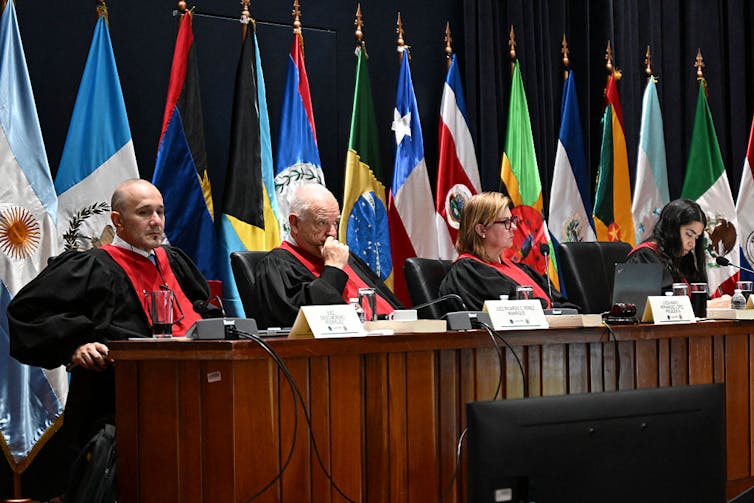As Climate Change and Energy Minister Chris Bowen this week to spruik his governmentÔÇÖs commitment to climate action, fossil fuel exporters such as Australia are under unprecedented scrutiny.
In a landmark ruling on Friday, Latin AmericaÔÇÖs highest human rights court found countries in that region to protect people from climate harms. The obligation includes tougher government regulations for fossil fuel extraction.
The in the Organization of American States. But it adds to a growing number of international rulings clarifying nationsÔÇÖ legal obligations to tackle the climate crisis ÔÇô especially if they export fossil fuels.
And it echoes : that climate change is an , and coal and gas exporters have a responsibility to act.
A legal tide is building
Australia is a major fossil-fuel exporter. When coal and gas mined in Australia is burned overseas, emissions are those of our entire domestic economy.
Since 2000, Australia has approved oil, gas and coal projects. This includes federal approval in May for WoodsideÔÇÖs North West Shelf project ÔÇô a off Western Australia.
Emissions from these projects damage EarthÔÇÖs climate, increasing the risk of harm to people .
As climate change worsens, the and others are calling on countries to phase out fossil fuel production. A string of litigation involving human rights and the environment is adding to the pressure.
In a ruling handed down late last week, the Inter-American Court of Human Rights said people have the right to a stable climate and that states should .
The ruling was . According to an , it said nation-states should require fossil-fuel companies to:
take effective measures to combat climate change and related human rights impacts, to conduct appropriate due diligence, to adopt transition plans, and to provide accurate information regarding the impacts of their operations on climate change and human rights.
The ruling was an ÔÇťadvisory opinionÔÇŁ, and not legally binding. But it establishes the law on human rights obligations for the nations involved, and interpretations of international law for other nations.

It comes as the from the , to clarify countriesÔÇÖ obligations under international law to protect EarthÔÇÖs climate and environment from greenhouse gas emissions.
The campaign for the case was in 2019 by a group of law students at the University of the South Pacific.
This ruling will apply directly to Australia. Judges in the case are likely to take into account the findings of the Inter-American Court of Human Rights ÔÇô and Australian policymakers will be watching closely.
International law is catching up with the science
Key instruments of international law, such as the , were developed in the decades before a scientific consensus on global warming.
But the science has moved on. And itÔÇÖs now clear that nations have legal obligations to prevent human rights harms arising from climate change.
In 2022, the UN Human Rights Committee to protect Indigenous Torres Strait Islanders from the adverse impacts of climate change.
In May this year, UN Special Rapporteur on Climate Change and Human Rights, Elisa Morgera, end new fossil fuel projects and begin phasing out of fossil fuel production this decade, to protect human rights.
Australia only the Paris Agreement ÔÇô which requires countries to set targets to cut domestic emissions ÔÇô should apply when it comes to mitigating climate change. It has protecting human rights does not extend to obligations to tackle climate change by cutting emissions.
Such arguments have now been rejected by international courts and tribunals. Continuing to approve new fossil fuel projects, with no plan to phase out fossil fuel production, puts Australia in violation of international legal obligations.
AustraliaÔÇÖs obligations are also being considered in domestic cases. For instance, the Federal Court is next week on the governmentÔÇÖs obligations to cut emissions to protect Torres Strait Islanders from climate impacts. If successful, the case may force the federal government to rapidly reduce emissions.
The law is not on AustraliaÔÇÖs side
On his trip to the Pacific this week, Chris Bowen will emphasise AustraliaÔÇÖs commitment to tackling climate change, and progress discussions on the joint AustraliaÔÇôPacific next year. He told the media:
Australia and the PacificÔÇÖs joint bid for COP31 is about ensuring that the regionÔÇÖs voice shapes global climate action for the benefit of the Australian and Pacific people.
I look forward to deepening our cooperation with Pacific neighbours; not only to build a fairer, cleaner energy future, but to bring COP31 home for our region in 2026.
People in the Pacific now know international law is on their side. Ultimately, a managed shift away from fossil fuels is inevitable - and the time for Australian policymakers to ignore the industryÔÇÖs climate harms is ending.![]()
, Research Associate, Institute for Climate Risk and Response, and , Senior Visiting Fellow and Research Lead, ╗╩╣┌▓╩Ă▒ Law & Justice,
This article is republished from under a Creative Commons license. Read the .







.jpg/jcr:content/renditions/cq5dam.web.1920.1920.jpeg)
